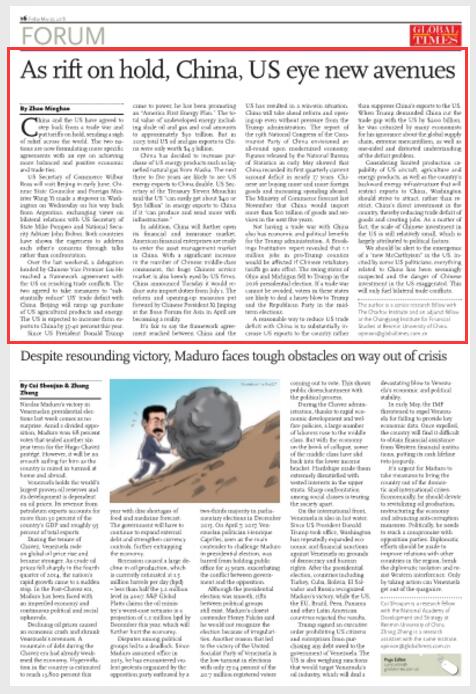Major Power Relations
Your Present Location: PROGRAMS> Major Power RelationsZhao Minghao: As trade rift on hold, China, US eye new avenues
By Zhao Minghao Source: Global Times Published: 2018-5-24
China and the US have agreed to step back from a trade war and put tariffs on hold, sending a sigh of relief across the world. The two nations are now formulating more specific agreements with an eye on achieving more balanced and positive economic and trade ties.

US Secretary of Commerce Wilbur Ross will visit Beijing in early June. Chinese State Councilor and Foreign Minister Wang Yi made a stopover in Washington on Wednesday on his way back from Argentina, exchanging views on bilateral relations with US Secretary of State Mike Pompeo and National Security Adviser John Bolton. Both countries have shown the eagerness to address each other`s concerns through talks rather than confrontation.
Over the last weekend, a delegation headed by Chinese Vice Premier Liu He reached a framework agreement with the US on resolving trade conflicts. The two agreed to take measures to "substantially reduce" US` trade deficit with China. Beijing will ramp up purchase of US agricultural products and energy. The US is expected to increase farm exports to China by 35-40 percent this year.
Since US President Donald Trump came to power, he has been promoting an "America First Energy Plan." The total value of undeveloped energy including shale oil and gas and coal amounts to approximately $50 trillion. But in 2017, total US oil and gas exports to China were only worth $4.3 billion.
China has decided to increase purchase of US energy products such as liquefied natural gas from Alaska. The next three to five years are likely to see US energy exports to China double. US Secretary of the Treasury Steven Mnuchin said the US "can easily get about $40 or $50 billion" in energy exports to China if it "can produce and send more with infrastructure."
In addition, China will further open its financial and insurance market. American financial enterprises are ready to enter the asset management market in China. With a significant increase in the number of Chinese middle-class consumers, the huge Chinese service market is also keenly eyed by US firms. China announced Tuesday it would reduce auto import duties from July 1. The reform and opening-up measures put forward by Chinese President Xi Jinping at the Boao Forum for Asia in April are becoming a reality.
It`s fair to say the framework agreement reached between China and the US has resulted in a win-win situation. China will take ahead reform and opening-up even without pressure from the Trump administration. The report of the 19th National Congress of the Communist Party of China envisioned an all-round open modernized economy. Figures released by the National Bureau of Statistics in early May showed that China recorded its first quarterly current account deficit in nearly 17 years. Chinese are buying more and more foreign goods and increasing spending aboard. The Ministry of Commerce forecast last November that China would import more than $10 trillion of goods and services in the next five years.
Not having a trade war with China also has economic and political benefits for the Trump administration. A Brookings Institution report revealed that 1.1 million jobs in pro-Trump counties would be affected if Chinese retaliatory tariffs go into effect. The swing states of Ohio and Michigan fell to Trump in the 2016 presidential election. If a trade war cannot be avoided, voters in these states are likely to deal a heavy blow to Trump and the Republican Party in the mid-term elections.
A reasonable way to reduce US trade deficit with China is to substantially increase US exports to the country rather than suppress China`s exports to the US. When Trump demanded China cut the trade gap with the US by $200 billion, he was criticized by many economists for his ignorance about the global supply chain, extreme mercantilism, as well as one-sided and distorted understanding of the deficit problem.
Considering limited production capability of US aircraft, agriculture and energy products, as well as the country`s backward energy infrastructure that will restrict exports to China, Washington should strive to attract, rather than restrict, China`s direct investment in the country, thereby reducing trade deficit of goods and creating jobs. As a matter of fact, the scale of Chinese investment in the US is still relatively small, which is largely attributed to political factors.
We should be alert to the emergence of a "new McCarthyism" in the US. Incited by some US politicians, everything related to China has been seemingly suspected and the danger of Chinese investment in the US exaggerated. This will only fuel bilateral trade conflicts.
The author is a visiting fellow at the Chongyang Institute for Financial Studies at Renmin University of China.
Key Words: China; US; trade; Zhao Minghao























































































 京公网安备 11010802037854号
京公网安备 11010802037854号





